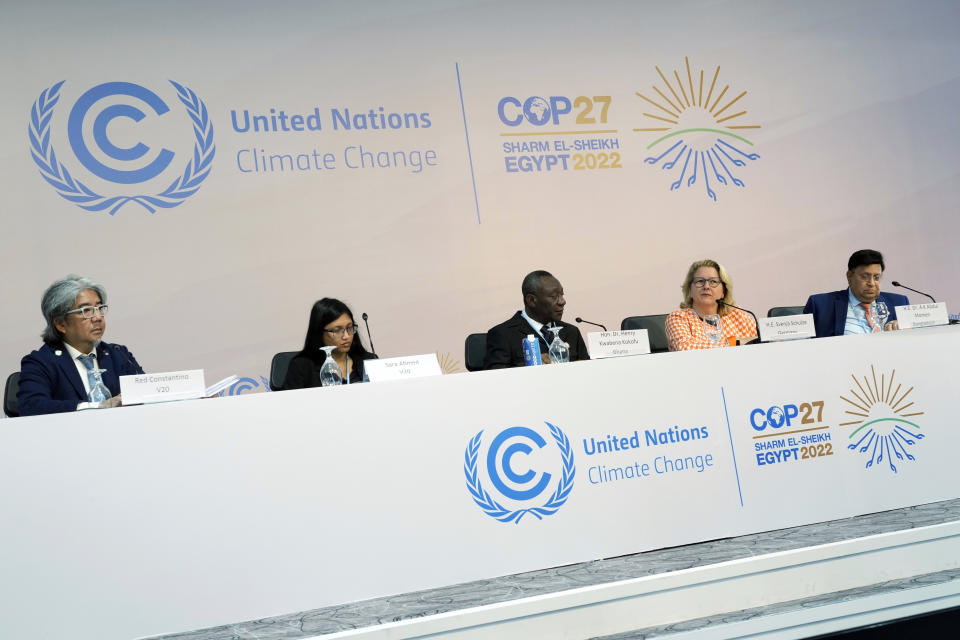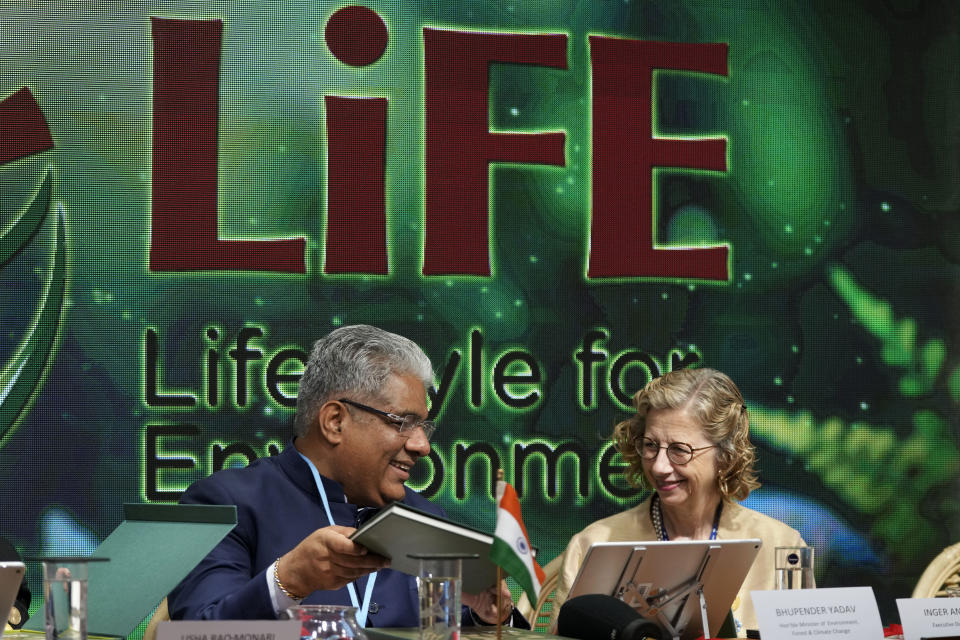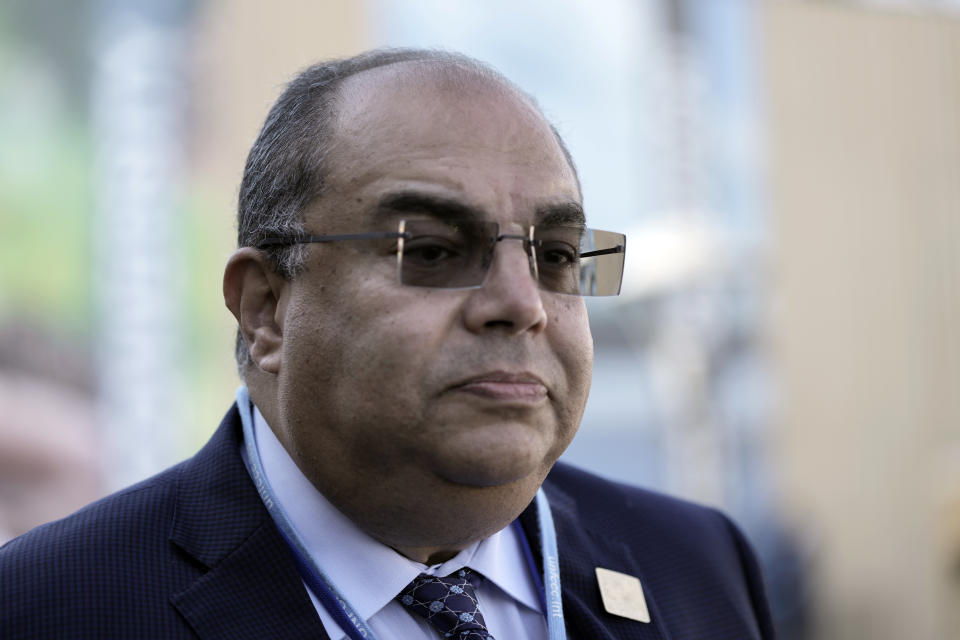The Latest | UN Climate Summit
SHARM EL-SHEIKH, Egypt (AP) — The Latest on COP27, the United Nations climate summit in Sharm el-Sheikh, Egypt.
A new ranking of how well countries are doing in addressing climate change puts Denmark top, followed by Sweden and Chile.
The annual Climate Change Performance Index published Monday by NewClimate Institute and Germanwatch leaves the first three places empty on the grounds that no country is on track to halve its emissions by 2025 compared to 1990 levels.
Of the 63 countries reviewed, Iran came last, below Saudi Arabia and Kazakhstan.
India was ranked eighth thanks to its low emissions and growing use of renewable power.
The European Union came 19th, while the United States trailed in 52nd place, though both improved on last year’s assessment. China, which is now the world’s biggest polluter, was in 51st place after falling down the list due to plans for new coal-fired power plants.
___
KEY DEVELOPMENTS:
— Climate confab heads into final week, warming goal uncertain
— In brutal drought, Kenyan herders look for hope underground
— Israel rushes to protect marine life as Mediterranean warms
___
Egypt, the host this year’s U.N. climate conference, supports a “just transition” from coal to renewable energy, the country’s climate change champion said.
Mahmoud Mohieldin, who is also an executive director with the International Monetary Fund, said “phasing out” coal, as many had hoped would be pledged at last year’s talks before ambitions were watered down, needs “adequate support” from rich countries to be successful.
“We need to be realistic here,” Mohieldin said. “Just transition means adequate support to phase out from coal.”
He added that phasing out coal globally “needs to be put in context,” saying that 600 million people in Africa have no access to electricity and would need support for to improve living standards through clean energy.
Mohieldin said Africa’s contribution to global greenhouse gas emissions could increase rapidly if African countries did not receive “adequate finance from public and private sources” and access to “research and development and patents” for clean energy sources.
___
India made an unexpected proposal over the weekend for this year’s climate talks to end with a call for a phase down of all fossil fuels.
The idea is likely to get strong pushback from oil and gas-exporting nations, including the United States, which promotes natural gas as a clean ‘bridge fuel’ to renewables.
Two diplomats who spoke to The Associated Press on condition of anonymity because the proposal was yet to be officially debated said India could be trying to get payback for last year’s meeting, when it was publicly shamed for resisting a call to phase out coal.
Countries compromised by calling for a vaguer “phase down” instead, which was nevertheless seen as significant because it was the first time a fossil fuel industry was put on notice.
___
More than two dozen climate activists protested to pressure industrialized nations to pay for the destruction caused by climate change in the most vulnerable nations.
The protest Monday came as the United Nations’ climate conference enters its second and final week in Egypt’s seaside resort of Sharm el-Sheikh. The protesters were seen dancing and chanting inside the conference’s Blue Zone, a U.N. territory.
Virginia Llorin, a protester from the Philippines, said activists will keep fighting for financing for the most vulnerable nations to be able to recover from the impacts of climate change and prepare themselves for future climate-related weather events.
“We can’t wait anymore,” she said.
___
The Group of Seven leading economies launched a new insurance system Monday to provide swift financial aid when nations are hit by devastating effects of climate change.
The so-called Global Shield is backed by the V20 group of 58 climate-vulnerable nations and will initially receive more than 200 million euros (dollars) in funding, mostly from Germany. Initial recipients include Bangladesh, Costa Rica, Fiji, Ghana, Pakistan, the Philippines and Senegal.
Ghana’s Finance Minister Ken Ofori-Atta called it “a path-breaking effort” that would help protect communities when lives and livelihoods are lost.
But civil society groups were skeptical, warning that it should not be used as a way to distract from the much broader effort to get big polluters to pay for the loss and damage they’ve caused with their greenhouse gases.
“We need a solution at the scale of the losses, and that means going beyond subsidized insurance,” said Rachel Simon of the environmental group Climate Action Network Europe.
She said new funds should also be created within the oversight of the U.N. climate talks, not on the sidelines, to ensure proper international oversight.
___
Global climate talks in Egypt headed into their second half on Monday with plenty of uncertainty left over whether there’ll be a substantial deal to combat climate change.
Tens of thousands of delegates from nearly 200 countries, observers, experts, activists and journalists, returned to the conference zone in the Red Sea resort of Sharm el-Sheikh after a one day break.
The U.N.’s top climate official appealed for constructive diplomacy to match the high-flying rhetoric heard during the opening days of the talks.
___
Follow AP’s climate and environment coverage at https://apnews.com/hub/climate-and-environment
___
Associated Press climate and environmental coverage receives support from several private foundations. See more about AP’s climate initiative here. The AP is solely responsible for all content.










